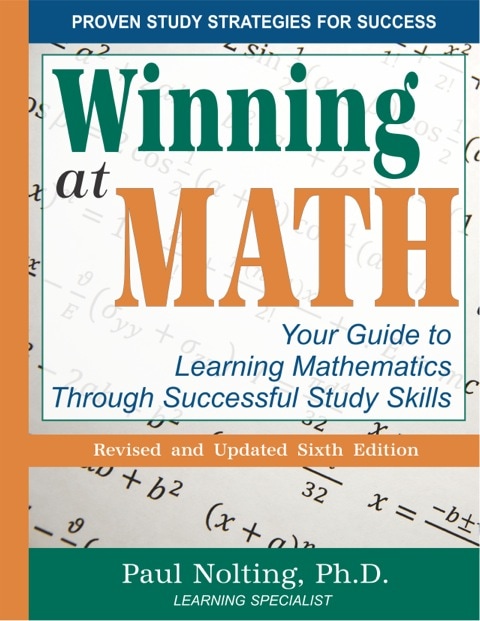Dr. Paul Nolting's Academic Success Press Blog: A Publication Dedicated to Math Success |
DR. PAUL NOLTING'S ACADEMIC SUCCESS PRESS BLOG
|
Of the many topics Paul regularly covers in his books and speeches, one of the most prominent involves early childhood experiences and their lifelong affect on students' attitudes toward math. When instructors, teachers, and Supplemental Instruction staff work with an anxious student to reduce or assuage his or her stress, they are in essence dealing with a lifetime of conditioning and the involuntary responses it causes. These responses not only affect mood, but also basic brain function.
With all of this in mind, we recently stumbled upon a great article on this topic in the Journal of Cognition and Development. Written by Gunderson, Levine and Block, "Math Anxiety, Working Memory and Math Achievement in Early Elementary School" does a magnificent job summarizing both the chemical and attitudinal responses elementary school students often have toward math. The article explores the relationship between math anxiety and working memory in elementary school students. Though it focuses on young children, the implications of the article’s findings are highly relevant to college math departments, as they demonstrate not only the origins of students’ math anxiety, but also what type of student, exactly, tends to struggle with the issue. Intriguingly, the study shows that students with the highest levels of working memory suffered more acutely from math anxiety than anxious students with lower levels of working memory, as these students “tend to rely on WM-intensive solution strategies and these strategies are likely disrupted when WM capacity is co-opted by math anxiety.” For their study, the authors of the article administered math achievement and working memory assessments to 154 first- and second-grade students. Days later, the authors used a new scale they’d developed to assess the same students’ anxiety levels. In the end, the authors found that “children who are higher in WM may be most susceptible to the deleterious effects of math anxiety.” This is particularly worrisome, they argue, because “these students arguably have the greatest potential for high achievement in math.” Anxiety sometimes causes these students to openly avoid taking math courses, which not only affects their own respective futures, but also saps college math departments of capable students who might boost university-wide performance statistics. For more information, please seek out: Ramirez, G. Gunderson, E., Levine, S., Beilock, S.L. “Math Anxiety, Working Memory and Math Achievement in Early Elementary School.” Journal of Cognition and Development. January, 2012.
0 Comments
Leave a Reply. |
AuthorDr. Nolting is a national expert in assessing math learning problems, developing effective student learning strategies, assessing institutional variables that affect math success and math study skills. He is also an expert in helping students with disabilities and Wounded Warriors become successful in math. He now assists colleges and universities in redesigning their math courses to meet new curriculum requirements. He is the author of two math study skills texts: Winning at Math and My Math Success Plan. Blog HighlightsAmerican Mathematical Association of Two-Year Colleges presenter, Senior Lecturer-Modular Reader Contributions
|
Proudly powered by Weebly


 RSS Feed
RSS Feed